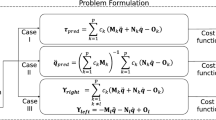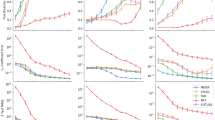Abstract
Linear multistep methods (LMMs) are popular time discretization schemes for solving the forward problem on differential equations. Recently, LMMs together with deep neural networks have been shown to successfully discover dynamical systems from data. In this work, we propose a class of LMM-based sparse regression approaches for the discovery of nonlinear dynamical systems. The work builds on the sparse identification of nonlinear dynamics (SINDy) framework presented in Brunton et al. (Proc Natl Acad Sci USA 113: 3932–3937, 2016), allowing closed form expression for the governing equations and therefore the resulting data-driven model can give insights into the underlying physics. Compared to the standard SINDy algorithm, the proposed LMM-based SINDy approach allows for more accurate and robust model recovery from data with a wide range of noise levels, without requiring pointwise derivative approximations and conventional noise filtering. Numerical results are presented to demonstrate the effectiveness of the proposed method.
















Similar content being viewed by others
References
Both, G.-J., Choudhury, S., Sens, P., Kusters, R.: DeepMod: deep learning for model discovery in noisy data. J. Comput. Phys. 428, 109985 (2021)
Brunton, S.L., Kutz, J.N.: Data-Driven Science and Engineering: Machine Learning, Dynamical Systems, and Control. Cambridge University Press, Cambridge (2019)
Brunton, S.L., Proctor, J.L., Kutz, J.N.: Discovering governing equations from data by sparse identification of nonlinear dynamical systems. Proc. Natl. Acad. Sci. USA 113, 3932–3937 (2016)
Cortiella, A., Park, K.-C., Doostan, A.: Sparse identification of nonlinear dynamical systems via reweighted \(l_1\)-regularized least squares. Comput. Methods Appl. Mech. Eng. 376, 113620 (2021)
Du, Q., Gu, Y., Yang, H., Zhou, C.: The discovery of dynamics via linear multistep methods and deep learning: error estimation. SIAM J. Numer. Anal. 60, 2014–2045 (2022)
Fasel, U., Kutz, J.N., Brunton, B.W., Brunton, S.L.: Ensemble-SINDy: robust sparse model discovery in the low-data, high-noise limit, with active learning and control. Proc. R. Soc. A 478, 20210904 (2021)
Gander, W., Gander, M., Kwok, F.: Scientific Computing: An Introduction Using Maple and MATLAB. Springer, Berlin (2014)
Goyal, P., Benner, P.: Discovery of nonlinear dynamical systems using a Runge–Kutta inspired dictionary-based sparse regression approach. Proc. R. Soc. A 478, 20210883 (2022)
Hairer, E., Wanner, G.: Solving Ordinary Differential Equations I. Nonstiff Problems. Springer, Berlin (1996)
Hairer, E., Wanner, G.: Solving Ordinary Differential Equations II. Stiff and Differential Algebraic Problems. Springer, Berlin (1996)
Harlim, J., Jiang, S.W., Liang, S., Yang, H.: Machine learning for prediction with missing dynamics. J. Comput. Phys. 428, 109922 (2021)
Jordan, M.I., Mitchell, T.M.: Machine learning: trends, perspectives, and prospects. Science 349, 255–260 (2015)
Kang, S.H., Liao, W., Liu, Y.: IDENT: identifying differential equations with numerical time evolution. J. Sci. Comput. 87, 1 (2021)
Kariya, T., Kurata, H.: Generalized Least Squares. Wiley, New York (2004)
Keller, R.T., Du, Q.: Discovergy of dynamics using linear multistep methods. SIAM J. Numer. Anal. 59, 429–455 (2021)
Long, Z., Lu, Y., Dong, B.: pde-net 2.0: learning pdes from data with a numeric-symbolic hybrid deep network. J. Comput. Phys. 399, 108925 (2019)
Lu, F., Zhong, M., Tang, S.: Nonparametric inference of interaction laws in systems of agents from trajectory data. Proc. Natl. Acad. Sci. USA 116, 14424–14433 (2019)
Mangan, N.M., Kutz, J.N., Brunton, S.L., Proctor, J.L.: Model selection for dynamical systems via sparse regression and information criteria. Proc. R. Soc. A 473, 20170009 (2017)
Marx, V.: Biology: the big challenges of big data. Nature 498, 255–260 (2013)
Messenger, D.A., Bortz, D.M.: Weak SINDy: Galerkin-based data-driven model selection. Multiscale Model. Simul. 19, 1474–1497 (2021)
Messenger, D.A., Bortz, D.M.: Weak SINDy for partial differential equations. J. Comput. Phys. 443, 110525 (2021)
Qin, T., Wu, K., Xiu, D.: Data driven governing equation approximation using deep neural networks. J. Comput. Phys. 395, 620–635 (2019)
Raissi, M., Karniadakis, G.E.: Hidden physics models: machine learning of nonlinear partial differential equations. J. Comput. Phys. 357, 125–141 (2018)
Raissi, M., Perdikaris, P., Karniadakis, G.E.: Inferring solutions of differential equations using noisy multifidelity data. J. Comput. Phys. 335, 736–746 (2017)
Raissi, M., Perdikaris, P., Karniadakis, G.E.: Machine learning of linear differential equations using Gaussian processes. J. Comput. Phys. 348, 683–693 (2017)
Raissi, M., Perdikaris, P., Karniadakis, G. E.: Multistep neural newworks for data-driven discovery of nonlinear dynamical systems. arXiv:1801.01236, (2018)
Rudy, S.H., Brunton, S.L., Proctor, J.L., Kutz, J.N.: Data-driven discovery of partial differential equations. Sci. Adv. 3, e1602614 (2017)
Rudy, S.H., Alla, A., Brunton, S.L., Kutz, J.N.: Data-driven identification of parametric partial differential equations. SIAM J. Appl. Dyn. Syst. 18, 643–660 (2019)
Rudy, S.H., Kutz, J.N., Brunton, S.L.: Deep learning of dynamics and signal-noise decomposition with time-stepping constraints. J. Comput. Phys. 396, 483–506 (2019)
Schaeffer, H.: Learning partial differential equations via data discovery and sparse optimization. Proc. R. Soc. A 473, 20160446 (2017)
Schaeffer, H., McCalla, S.G.: Sparse model selection via integral terms. Phys. Rev. E 96, 023302 (2017)
Schaeffer, H., Tran, G., Ward, R.: Extracting sparse high-dimensional dynamics from limited data. SIAM J. Appl. Math. 78, 3279–3295 (2018)
Schaeffer, H., Tran, G., Ward, R., Zhang, L.: Extracting structured dynamical systems using sparse optimization with very few samples. Multiscale Model. Simul. 18, 1435–1461 (2020)
Schmidt, M., Lipson, H.: Distilling free-form natural laws from experimental data. Science 324, 81–85 (2009)
Tibshirani, R.: Regression shrinkage and selection via the lasso. J. R. Stat. Soc. B 58, 267–288 (1996)
Tipireddy, R., Perdikaris, P., Stinis, P., Tartakovsky, A.: A comparative study of physics-informed neural network models for learning unknown dynamics and constitutive relations. arXiv:1904.04058, (2019)
Tran, G., Ward, R.: Exact recovery of chaotic systems from highly corrupted data. Multiscale Model. Simul. 15, 1108–1129 (2017)
Wang, W.-X., Yang, R., Lai, Y.-C., Kovanis, V., Grebogi, C.: Predicting catastrophes in nonlinear dynamical systems by compressive sensing. Phys. Rev. Lett. 106, 154101 (2011)
Wu, K., Xiu, D.: Numerical aspects for approximating governing equations using data. J. Comput. Phys. 384, 200–221 (2019)
Wu, K., Xiu, D.: Data-driven deep learning of partial differential equations in modal space. J. Comput. Phys. 408, 109307 (2020)
Wu, K., Qin, T., Xiu, D.: Structure-preserving method for reconstructing unknown Hamiltonian systems form trajectory data. SIAM J. Sci. Comput. 42, A3704–A3729 (2020)
Xie, X., Zhang, G., Webster, C.G.: Non-instructive inference reduced order model for fluids using deep multistep neural network. Mathematics 7, 757 (2019)
Zhang, L., Schaeffer, H.: On the convergence of the SINDy algorithm. Multiscale Model. Simul. 17, 948–972 (2019)
Zhang, S., Lin, G.: Robust data-driven discovergy of governing physical laws with error bars. Proc. R. Soc. A 474, 20180305 (2018)
Zhang, S., Lin, G.: SubTSBR to tackle high noise and outliers for data-driven discovery of differential equations. J. Comput. Phys. 428, 109962 (2021)
Acknowledgements
The authors are very grateful to the referees for their constructive comments and valuable suggestions, which greatly improved the original manuscript of the paper. This work was supported by the Scientific and Technological Research Program of Chongqing Municipal Education Commission (No. KJQN202000543), the Natural Science Foundation Project of CQ CSTC (No. cstc2021jcyj-msxmX0034), and the Program of Chongqing Innovation Research Group Project in University (No. CXQT19018).
Author information
Authors and Affiliations
Corresponding author
Additional information
Publisher's Note
Springer Nature remains neutral with regard to jurisdictional claims in published maps and institutional affiliations.
Rights and permissions
Springer Nature or its licensor (e.g. a society or other partner) holds exclusive rights to this article under a publishing agreement with the author(s) or other rightsholder(s); author self-archiving of the accepted manuscript version of this article is solely governed by the terms of such publishing agreement and applicable law.
About this article
Cite this article
Chen, H. Data-driven sparse identification of nonlinear dynamical systems using linear multistep methods. Calcolo 60, 11 (2023). https://doi.org/10.1007/s10092-023-00507-7
Received:
Revised:
Accepted:
Published:
DOI: https://doi.org/10.1007/s10092-023-00507-7
Keywords
- Data-driven discovery
- Nonlinear dynamics
- Sparse regression
- Generalized least squares
- Linear multistep methods




